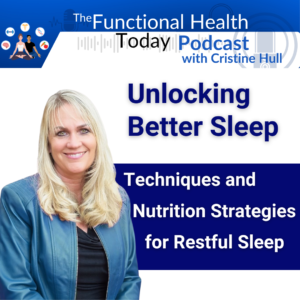
Inflammation is your body’s natural response to injury or illness. But when inflammation in your body becomes chronic, it can contribute to serious health issues like heart disease, diabetes, arthritis, and obesity. While bodies need inflammation to heal, chronic inflammation can damage tissues over time, increasing the risk of chronic conditions.
One of the key factors that cause inflammation is diet. The American diet, often high in processed foods, refined carbohydrates, and trans fat, has been shown to promote inflammation and contribute to inflammatory disease. But the good news? Making anti-inflammatory dietary and lifestyle changes can help you reduce chronic inflammation and improve overall health.
KEY POINTS
Chronic inflammation can contribute to serious health conditions like heart disease, diabetes, and arthritis, making it essential to manage through diet and lifestyle.
Pro-inflammatory foods such as fried foods, processed meats, refined carbohydrates, and trans fats can worsen inflammation and increase health risks.
An anti-inflammatory diet rich in fatty fish, fruits, vegetables, whole grains, nuts, and olive oil can help reduce inflammation and promote overall well-being.
Lifestyle changes like regular exercise, stress management, quality sleep, and hydration play a crucial role in reducing chronic inflammation and supporting long-term health.

Pop in your email below, and we’ll zip it straight to your inbox so you never lose it!
What Are Inflammatory Foods That Cause Inflammation?
Not all foods are created equal—some help fight inflammation, while others cause inflammation and lead to long-term health issues. Highly processed foods and fried foods cause inflammation, also foods like red meat and processed meats, can trigger an autoimmune response, increasing systemic inflammation and inflammatory messengers in the body.
Top Pro-Inflammatory Foods to Avoid:
- Fried foods (think French fries, potato chips, and fried chicken)
- Processed meat (bacon, sausage, hot dogs)
- Refined carbohydrates (white bread, pastries, and sugary cereals)
- Trans fat found in margarine, packaged snacks, and fast food
- Foods high in omega-6 fatty acids (certain vegetable oils like corn and soybean oil)
A registered dietitian will tell you that an unhealthy diet filled with these pro-inflammatory foods can contribute to obesity, disease and diabetes, and even risk of heart disease. If you want to reduce inflammation, it’s essential to avoid foods that trigger an inflammatory lifestyle and focus on foods with antioxidants instead.
Looking to take control of your weight & nutrition?

How to Reduce Chronic Inflammation with an Anti-Inflammatory Diet
A healthy diet packed with anti-inflammatory foods can help reduce inflammation in the body and lower the risk of chronic conditions. A diet high in fruits and vegetables, whole grains, and healthy fats may have anti-inflammatory properties that support long-term wellness.
Anti-Inflammatory Foods to Add to Your Diet:

- Fatty fish (salmon, mackerel) rich in omega-3 fatty acids
- Fruits and vegetables, especially berries, leafy greens, and bell peppers
- Nuts and seeds (almonds, walnuts, flaxseeds)
- Olive oil, a staple in the Mediterranean diet
- Whole grains like quinoa and brown rice
- Plant-based protein sources like beans and lentils
A less processed diet with anti-inflammatory foods can make a huge difference in reducing inflammation. A dietitian may also recommend the keto diet, as studies show that maintaining a weight with a ketogenic diet can help with inflammation-related conditions like type 2 diabetes.
What Lifestyle Changes Can Help Reduce Inflammation in the Body?
Diet is only part of the equation—your lifestyle choices also affect inflammation in the body. The Harvard School of Public Health suggests that minutes of moderate exercise, stress management, and quality sleep all play a role in managing inflammation.
Simple Ways to Reduce Chronic Inflammation:
- Stay active: Engage in at least 30 minutes of moderate exercise daily
- Manage stress: High cortisol levels can promote inflammation
- Improve sleep: Poor sleep habits increase inflammatory markers
- Hydrate: Drinking plenty of water helps flush out toxins
- Avoid smoking and excessive alcohol: These can cause inflammation and worsen chronic conditions
Taking these steps can reduce inflammation and promote an overall healthy diet and lifestyle. If you’re struggling with inflammation-related health issues, visit a clinic to discuss a personalized approach with a registered dietitian.
What Are the Long-Term Effects of Chronic Inflammation?
While inflammation is your body’s way of healing, sometimes inflammation persists, leading to severe health complications. Chronic inflammation has been linked to conditions like heart disease, arthritis, obesity, and type 2 diabetes. Long-term inflammation can also affect your joint pain, sacroiliac joint pain, and even cognitive function.
Key Takeaways on Chronic Inflammation:
- Chronic inflammation can damage tissues and organs over time
- An anti-inflammatory diet can help manage and reduce inflammation
- Lifestyle changes like exercise, stress reduction, and sleep are crucial
- Avoiding processed foods, fried foods, and pro-inflammatory ingredients is essential
If you want more information on how diet and lifestyle changes can help you reduce chronic inflammation, consider consulting a dietitian or joining a diet and exercise program tailored to your needs. There’s no miracle diet really, but making informed choices can significantly impact your health and well-being.











